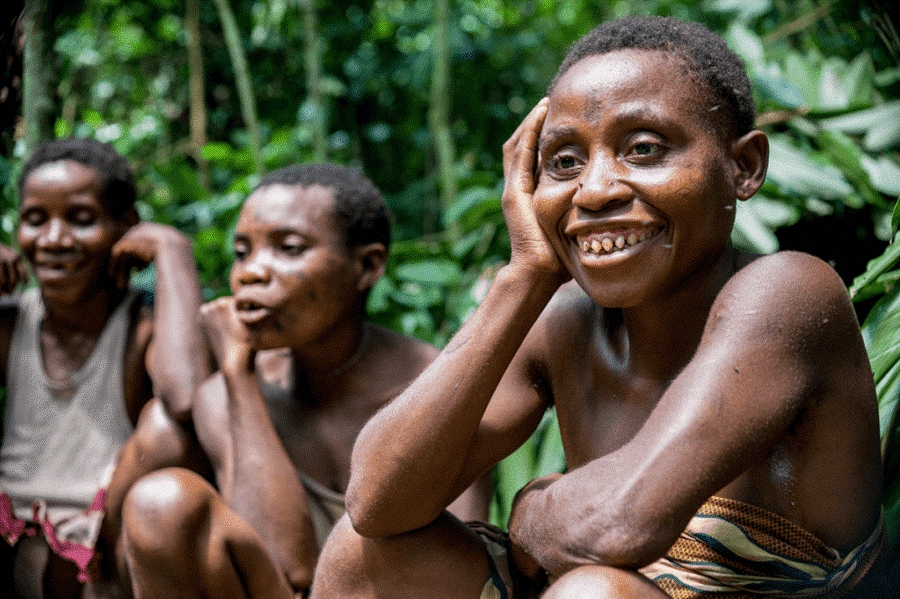Swaziland, currently known as Eswatini, is a small land-locked country located in Southern Africa. The Kingdom is one of the most popular African countries because of its rich culture and traditional ceremonies. In 2018, Swaziland was renamed Eswatini by King Mswati III to maintain its precolonial heritage. Despite several modern-day and Western influences, the Swazi people have managed to preserve their cultural beliefs and practices, which are a vital part of their daily activities. Swazi communities organize colorful ceremonies annually to celebrate their culture and traditions. Some of the most popular cultural ceremonies include Umhlanga (Reed Dance), Incwala (Kingship Ceremony), and Buganu (Marula) Festival.
Umhlanga Festival (Reed Dance)
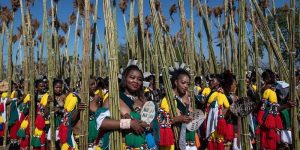
The Umhlanga or Reed Dance Festival is one of Eswatini’s most renowned cultural events. It is an annual event, usually held in late August or early September, where the Kingdom showcases its cultural pride and unity. The event is usually timed using the phases of the moon. A full moon indicates the optimum time for the Umhlanga festival. The word Umhlanga is derived from a local tribe called Zulu which means a place of reeds. Over 40,000 unmarried and childless Eswatini girls and women go to the river to cut reeds and present them to the Queen Mother during the festival. This act was a symbol of the honor the Kingdom held for the Queen Mother for the role she played as the mother of the nation. Over time, the ceremony developed into a symbol of Eswatini Kingdowm’s pride and unity and a symbol of strength and solidarity among women through working together.
The Reed Dance Festival can be traced back to the earliest days of the Eswatini Kingdom, which was established in the mid-18th Century. The ceremony was first established as the Umchwasho ceremony, which played a crucial role in preserving the chastity of young girls, praising the Queen Mother’s labor, and preserving the culture of Eswatini. During this time King Sobhuza II (1921-1982) was in power and he worked hard to preserve Eswatini’s cultural beliefs and practices by establishing such cultural events.
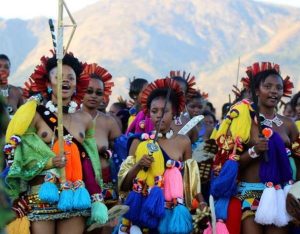
Umhlanga is usually a multiple-day festival that attracts both local and international tourists. The event often takes place over 8 days. On the 6th and 7th day, visitors or tourists are allowed to join the colorful parade and dance and witness one of the most important annual events in Eswatini. The 7th day is usually a public holiday in the Kingdom.
Incwala (Kingship Ceremony)
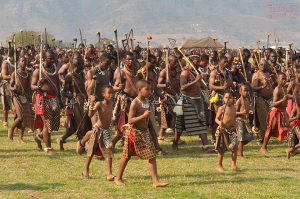
The Incwala festival is one of Eswatini’s most important cultural events and is among the remaining cultural practices that represents common practices that used to take place in other African communities. Incwala means ‘first fruits’. The tasting of the season’s first harvest is only part of the festival’s list of rituals. The Incwala festival features activities for cleansing and renewal, and most importantly, celebrating kingship.
The festival kicks off when young men across the entire kingdom cut sacred reeds, which are then presented to the King. the reeds symbolize the people’s loyalty and commitment to the monarch. The act of presenting the King with these sacred reeds symbolizes the rejuvenation of the kingdom and the renewal of the King’s authority. One of the most iconic parts of the festival is when young men, adorned in colorful traditional attire (including animal skins and colorful feathers) dance to the beat of the drums. This part of the festival is a sight to behold and it captures crucial details of the Eswatini culture.
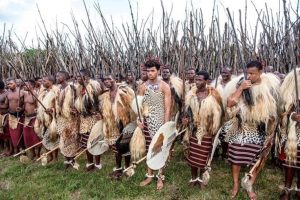
During the festival, traditional healers spiritual figures perform rituals that are believed to bring blessings and good tidings to the people of Eswatini and their King. They also promote prosperity and peace in the Kingdom in the next year.
The event usually takes place annually either during the last week of December or the first week of January. Tourists and visitors looking to be part of this cultural experience have an opportunity to do so and interact with local communities during this time. However, it is important to note that one must adhere to given customary traditions to attend these events. The festival is divided into two major parts: the small Incwala and the big Incwala.
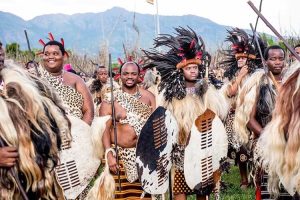
The small Incwala comes first and is locally known as the Incwala lencane. This phase begins with the apperance of the full moon in November and is charcterized by a group of locals referred to as Bemanti, which means ‘water people’. These locals are then divided into two groups: a smaller group which goes towards the rivers and a larger group that goes towards the ocean to collect water. Both groups then converge at the Queen’s quarters in Lobamba to celebrate the appearance of the full moon.
The big Incwala, locally known as the Incwala lenkhulu, takes place 14 days later over a 6-day period. This is the major part of the festival as this is when the young males present their Lusekwane shrubs and the red bush willow known as the Imbondvo that will be used in the construction of the King’s quarters (Inhlambelo). The King is also presented with the first fruit which he eats. The locals in attendance also eat their first fruits as they start dancing and merry making. During the final day, also known as log day, the locals light a big bonfire which they use to prepare meat as they dance and celebrate to signify the successful end of the year. The king is not seen in public until the appearance of another full moon where the shrubs and branches used to construct his Inhlambelo are burnt in preparation for the ceremony.
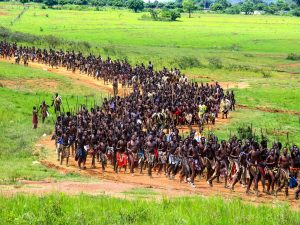
Buganu (Marula) Festival
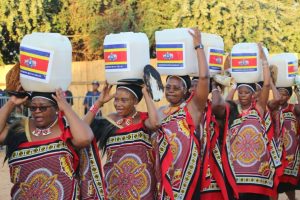
Buganu is the Zulu word for ‘marula beer’. The Buganu festival signifies the beginning of marula season. In Eswatini, Marula fruits are often used in brewing traditional brew. When green mature marual fruits fall from the tree, women and children are taksed with the responsibility to gather and store them until they are ripe. Ripe fruits are then places into water then sugar is added to facilitate the fermentation process. This mixture is then distilled to create beer, which is called Buganu or marual beer.
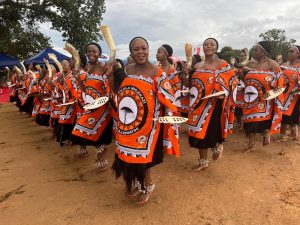
The Buganu festival is crucial in the cultural and economic aspects of the Eswatini community. Just like in other festivals, the Queen Mother and the King are always in attendance. They take the initiatives to visit various parts of the Kingdom in celebration of the beginning of marula season. The festival usually takes place in the royal residences and is charcterized by traditional dances, songs, and the presentation of traditional brew to the royal family. One of Queen Mother’s many initiatives is the use of marula fruits to manufacture beauty products. Therefore, the Buganu Festival is an important event in Eswatini culture.
References
Africa Tour Operators. (2024). Incwala festival. https://www.africatouroperators.org/swaziland/incwala-festival/
- African. (2024). The incwala festival. Safaris African. https://africansafaris.au/the-incwala-festival/
Pafen, K. (2023). Umhlanga reed dance Eswatini: 26 things to know! Our Planet in my Lens. https://ourplanetinmylens.com/umhlanga-reed-dance-festival-eswatini/
The Kingdom of Eswatini A Royal Experience. (n.d.). Incwala festival. https://www.thekingdomofeswatini.com/eswatini-experiences/events/incwala-festival/
The Kingdom of Eswatini: A Royal Experience. (n.d.). Marula festival. https://www.thekingdomofeswatini.com/eswatini-experiences/events/marula-festival/
The Kingdom of Eswatini: A Royal Expeirnece. (n.d.). Umhlanga reed dance. https://www.thekingdomofeswatini.com/eswatini-experiences/events/umhlanga-reed-dance/

